Whoever Controls the Media also Controls Opinions and Attitudes of the People - IELTS Writing Task 2
10 min read
Updated On
-
Copy link
Learn how to write IELTS Writing Task 2 samples on 'Whoever Controls the Media also Controls Opinions and Attitudes of the People'. Understand the essay structure and key vocabulary to develop balanced, well-organized arguments for Band 7 and above.
Table of Contents
- Essay Question for ‘Whoever Controls the Media also Controls Opinions and Attitudes of the People’
- Outline for IELTS Agree Disagree Essay
- Sample Answers for Whoever Controls the Media also Controls Opinions and Attitudes of the People IELTS Writing Task 2
- Vocabulary to Use for Whoever Controls the Media also Controls Opinions and Attitudes of the People- IELTS Writing Task 2

Try AI Essay Checker for Instant Band Score
In an era dominated by 24/7 news cycles, social media platforms, and digital influencers, the media’s ability to shape public thought has become undeniable. The IELTS Writing Task 2 agree/disagree essay topic ‘Whoever controls the media also controls opinions and attitudes of the people’ presents us with an ongoing debate on the extent to which the media truly controls public opinion, and whether individuals can resist this influence.
In this article, we examine sample answers for the IELTS agree and disagree essay, ‘Whoever controls the media also controls opinions and attitudes of the people’, along with an outline and a list of good vocabulary words to use in an IELTS essay, which is crucial for achieving a 7+ band score.
Essay Question for ‘Whoever Controls the Media also Controls Opinions and Attitudes of the People’
You should spend about 40 minutes on this task.
Whoever controls the media also controls the opinions and attitudes of the people and there is little that can be done to rectify this. To what extent do you agree or disagree? Give your own opinion and relevant examples.
You should write at least 250 words.
Outline for IELTS Agree Disagree Essay
Given below is the outline that will help you to understand how to write agree-disagree essays in IELTS.
|
Introduction
Body Paragraph 1
Body Paragraph 2
Conclusion
|
Sample Answers for Whoever Controls the Media also Controls Opinions and Attitudes of the People IELTS Writing Task 2
You will find three IELTS Band 9 essay samples on the topic ‘Whoever Controls the Media also Controls Opinions and Attitudes of the People’, and these will help you write your own essay and achieve a high score.
Whoever Controls the Media also Controls Opinions and Attitudes of the People - Sample Answer 1
In today’s interconnected and information-driven world, the media has emerged as one of the most powerful forces shaping how people think, act, and form opinions. From traditional outlets like television and newspapers to modern digital platforms such as social media, the influence of media pervades every aspect of human life. I largely agree with the notion that those who control media channels possess immense power to influence public attitudes and behaviour, and unfortunately, very little can be done to completely neutralize this effect.
Firstly, media organizations play a decisive role in determining what information reaches the public and how it is presented. Through selective reporting, agenda-setting, and emotional storytelling, they can amplify certain issues while ignoring or downplaying others. For example, during political elections, major news networks often endorse particular candidates or parties, subtly shaping how voters perceive competence, trustworthiness, and credibility. Similarly, social media platforms use algorithms that prioritize content aligned with users’ previous preferences. This process, often referred to as creating “echo chambers,” reinforces existing beliefs and discourages critical thinking or exposure to opposing viewpoints. Consequently, people tend to develop polarized perspectives rather than well-rounded opinions.
Secondly, the commercial nature of most media outlets further compromises their objectivity. Since advertising revenue is a primary source of income, news corporations often prioritize profit over journalistic integrity. Sensational headlines, celebrity endorsements, and sponsored content are deliberately used to capture attention and drive engagement, sometimes at the cost of factual accuracy. This subtle form of manipulation can shape consumer behaviour and societal values, as people unconsciously absorb messages about lifestyle, beauty standards, or political ideologies. Although initiatives like media literacy education attempt to promote awareness and critical consumption of information, their influence remains limited when compared to the pervasive and persuasive nature of global media networks.
In conclusion, the media’s capacity to mold public thought and behaviour is both extraordinary and inescapable. While individuals can cultivate skepticism and seek balanced perspectives, the scale and sophistication of modern communication systems make complete resistance nearly impossible. Ultimately, those who control media narratives hold a significant share of power in shaping society’s collective consciousness and defining what is accepted as truth.
Get our Extensive Bundle for IELTS Writing (Academic) & simplify your writing worries!
Whoever Controls the Media also Controls Opinions and Attitudes of the People - Sample Answer 2
People often argue that media controls the opinions of the people and the general public and there is a lack of actions that are needed to resolve this. Well, I disagree with this belief as I feel that media is essential for the development of people and that it’s up to the viewers’ discretion as per what they perceive from the content.
It is very hard to diminish our reliance on media resources and as every society needs some sources of information in order to acquire the knowledge they need and the updates of the globe or at least, in their respective spaces. From scratch to the very zenith, media helps in enlightening and updating people on various fronts that not only helps them in taking prudential decisions but also mitigates and assuages the perils of traversing a wrong path owing to the lack of knowledge and reality.
Every member of society needs to get information. Without that, it would not be possible to involve in social, cultural and economic activities. For example, in order to trade successfully, companies should be aware of the situation in the global market, or people should be provided with social, cultural and political information in order to know what is happening around them. From this aspect, it is clear that for people it is very hard and nearly impossible to ignore media sources as our society heavily depends on the information. Additionally, with the right frame of mind, people can conquer the domain they are inclined towards with the help of the disseminated information through the media.
Though some say, the liberalisation of media hampers the thought processes of people by shaping their belief systems through caricaturing the real information in their own ways, however, I feel that it is not right and in fact, help people in passing through the gates of misinformation.
Conclusively, It could be said that media plays a vital role in updating people all across the globe and that if looked at the presentation with judicious use of the intellect, it is the best source of information that one might ever have.
Join our IELTS online classes and discuss your writing queries with the best experts!
Whoever Controls the Media also Controls Opinions and Attitudes of the People - Sample Answer 3
Unlock Essay
People often say that the role of media, be it entertainment streams or the news channels, have been rife and pervasive in recent years thereby making people vulnerable to fall into the sham and get beguiled by not so genuine kinds of stuff out there, moreover the permissive and liberal media laws impede to curb this development. I happen to be agreeing with this notion. In the forthcoming paragraphs, I shall be discussing my viewpoints on this proposition.
A large number of people use media for s pieces of information, updating news, communicating, or even entertaining. Hence, they absorb what they are presented through the media and, consequently, the media influences the users into believing in them. For instance, if people watch the commercials about any product frequently, they eventually tend to be induced to buy that product. This is how most of the media work; they are persuasive and convincing. Consequently, people’s minds absolutely are affected by receiving these things repeatedly.
Teenagers, who are credulous and gullible, are usually the main target of the media. Moreover, most of them love and admire celebrities and singers around their age and ordain them as their role models. In addition, television programming companies generally have the right to present anything that they want to. As a result, movies on our television are sometimes abusive and cruel which is not apt for youngsters as don’t have enough justification to judge what is righteous in the media. Consequently, they might emulate these behaviours, making them more aggressive towards their families and friends. To make it worse, at times, the forbearing regulatory boards promulgate and air such practices.
Some might say that media plays a vital role in making people informed and to halt its freedom might cease someone to get to the terms with what is happening around, however, in recent times it is conspicuously seen that such media outlets have soared the plight of hooliganism, vandalism and even some deleterious trends.
In conclusion, it can thus be stated that the media and the PR houses are also able to alter and structure people’s notions and standpoints inevitably and though subsequent actions could be taken, the demon of ‘Press Freedom” comes in between the way of recuperation of media shenanigans.
Want feedback on your IELTS Writing essay?
Submit IELTS Writing Essay for evaluation today!
Vocabulary to Use for Whoever Controls the Media also Controls Opinions and Attitudes of the People- IELTS Writing Task 2
Here is a list of advanced vocabulary word list for IELTS related to the topic, ‘Whoever Controls the Media also Controls Opinions and Attitudes of the People’, that will help you boost your vocabulary for similar essay topics.
|
Word/Phrase |
Meaning |
Example Sentence |
|---|---|---|
|
Pervade |
to spread through and be present in every part of something |
The sense of urgency pervaded the entire newsroom after the breaking story was announced. |
|
Amplify |
to make something stronger, more intense, or more noticeable |
Social media tends to amplify both positive and negative public opinions. |
|
Polarized |
divided into two sharply contrasting groups or sets of opinions or beliefs |
Political debates have become increasingly polarized due to biased reporting. |
|
Objectivity |
the state of being impartial and not influenced by personal feelings or opinions |
True journalism should aim for objectivity, regardless of commercial pressures. |
|
Sensational |
presenting information in a way that provokes public interest or excitement, often at the expense of accuracy |
The newspaper ran a sensational headline that exaggerated the incident. |
|
Collective consciousness |
the shared beliefs and moral attitudes that operate as a unifying force within society |
Social media movements often reshape a nation’s collective consciousness. |
|
Discretion |
the ability to make responsible decisions or choices |
Teachers should allow students some discretion in choosing their research topics. |
|
Zenith |
the highest point or most successful period |
The artist reached the zenith of his career after winning the international award. |
|
Prudential |
involving or showing care and foresight; prudent |
Taking prudential measures early can prevent large-scale financial losses. |
|
Assuage |
to make an unpleasant feeling less intense |
The government launched an awareness campaign to assuage public fears. |
|
Mitigate |
to make something less harmful, unpleasant, or bad |
Strong media ethics can help mitigate the spread of misinformation. |
|
Traverse |
to move across or through something |
The documentary traverses multiple continents to explore the impact of climate change. |
|
Caricature |
to represent or describe someone or something in a way that exaggerates certain features for comic or critical effect |
The article caricatured politicians as self-serving and dishonest. |
|
Liberalisation |
the process of removing restrictions or limitations, often in economic or political systems |
The liberalisation of media has allowed more voices but also more misinformation. |
|
Rife |
widespread, especially of something undesirable or harmful |
Corruption is still rife in many institutions despite strict regulations. |
|
Beguile |
to charm or enchant someone, often in a deceptive way |
The advertisement beguiled viewers with glamorous visuals and false promises. |
|
Impedes |
to delay or prevent someone or something by obstructing them; hinder |
Excessive bureaucracy often impedes innovation and rapid progress. |
|
Credulous |
too willing to believe that something is real or true |
Credulous audiences are more likely to fall for conspiracy theories online. |
|
Gullible |
easily deceived or tricked |
Scammers exploit gullible users through fake online investment schemes. |
|
Emulate |
to imitate or copy something, often with the aim of matching or surpassing it |
Many young entrepreneurs emulate the success stories of tech pioneers. |
|
Promulgate |
to promote or make widely known an idea or law |
The government promulgated new media regulations to ensure transparency. |
|
Conspicuously |
in a clearly visible or noticeable way |
The journalist conspicuously avoided mentioning any corporate sponsors. |
|
Hooliganism |
violent or rowdy behaviour by young people, typically in groups |
Online hooliganism has taken the form of mass trolling and cyberbullying. |
|
Deleterious |
causing harm or damage |
Prolonged exposure to violent content can have deleterious effects on young viewers. |
|
Recuperation |
the process of recovering or regaining something lost or taken |
The company’s quick recuperation after the scandal surprised investors. |
|
Shenanigans |
secret or dishonest activities or manoeuvres |
The leaked emails revealed the political shenanigans behind the campaign. |
To conclude, the question of who controls public opinion is more complex than ever in a world saturated with media. In order to create our own Band 7+ essay on this topic, take up IELTS Writing practice tests regularly and review your writing abilities to achieve a top IELTS score.
Useful Links:
- More and More People Read News on the Internet - IELTS Writing Task 2 (Agree Disagree Essay)
- Solving Environment Problems Should be the Responsibility of an International Organization – IELTS Writing Task 2
- News Media - IELTS Writing Task 2 Argumentative Essays
- IELTS Writing Penalty for Word Count | Avoid Losing Marks
- How to Write a Complex Sentence in IELTS Writing Task 2?
Practice IELTS Writing Task 2 based on Essay types

Start Preparing for IELTS: Get Your 10-Day Study Plan Today!
Explore other Writing Actual Tests

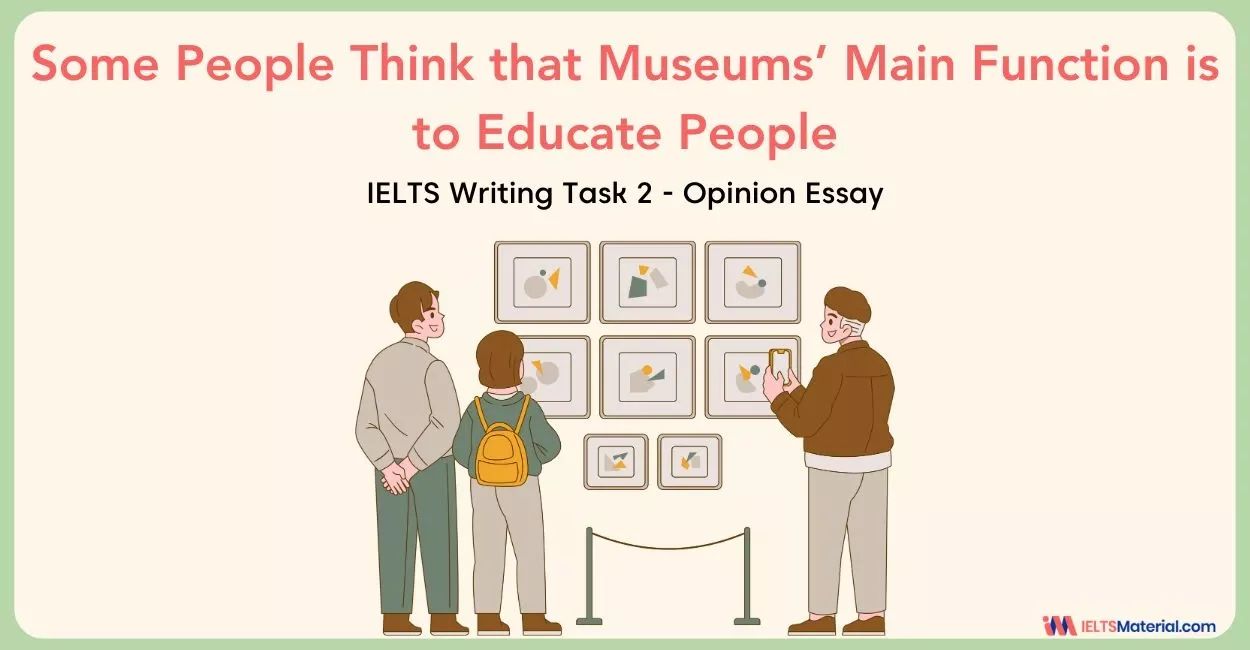
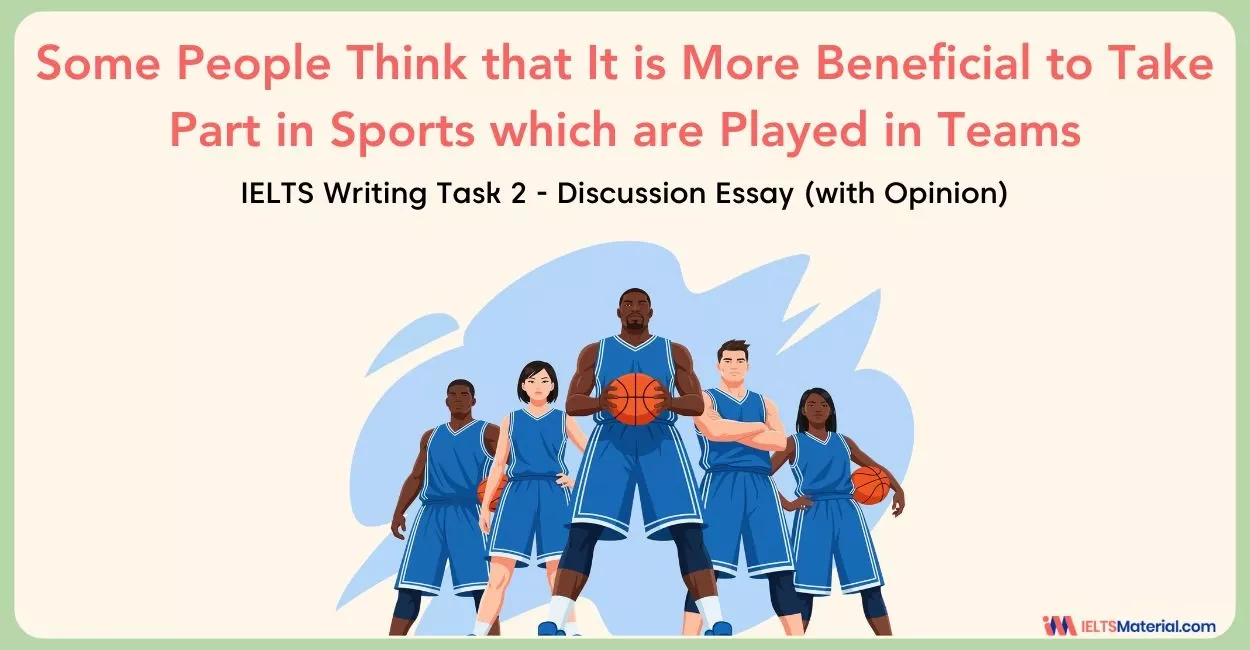
Recent Articles

Haniya Yashfeen
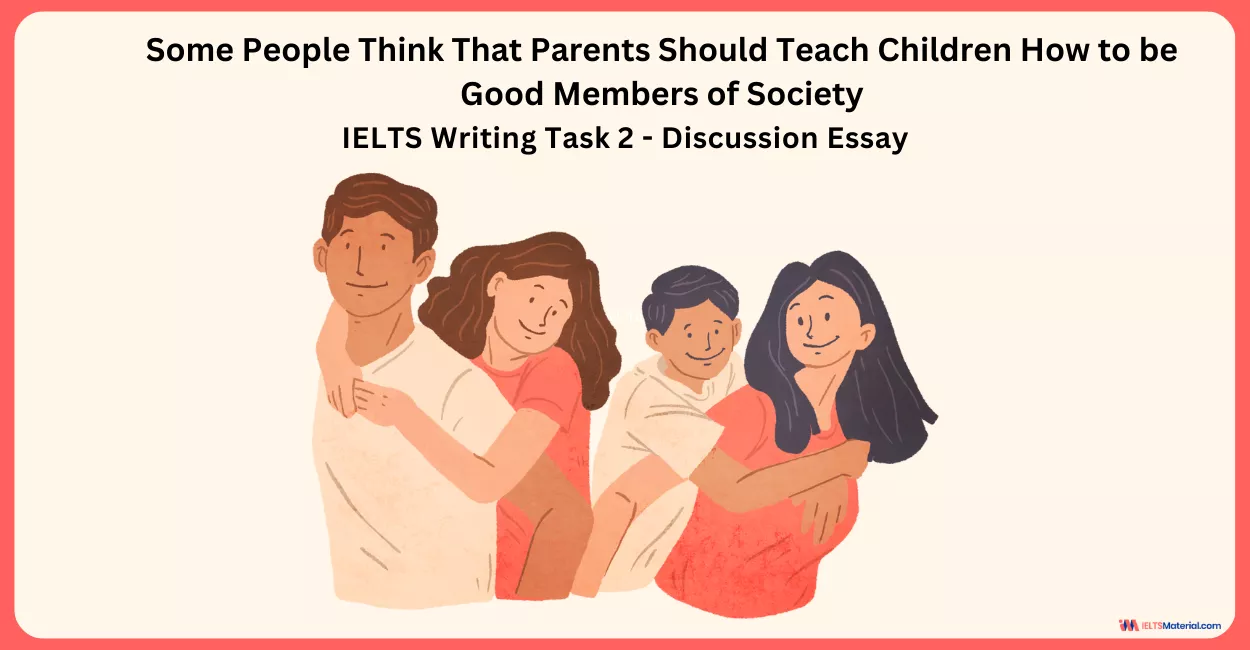

Prity Mallick

Kasturika Samanta
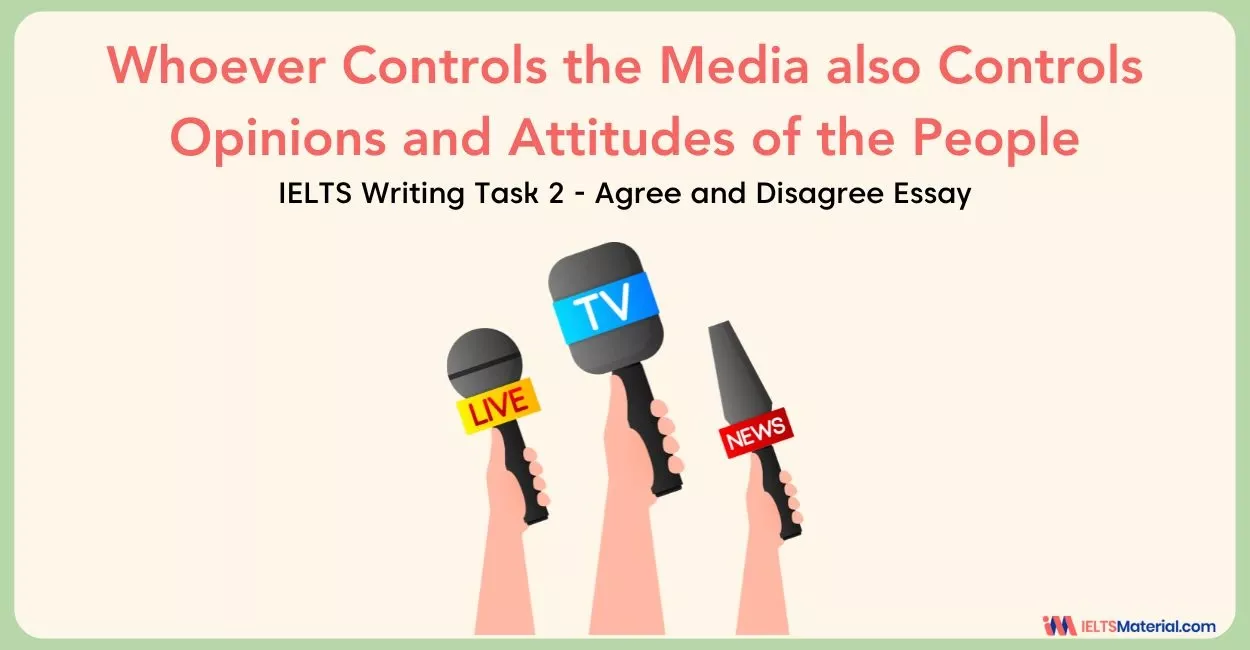

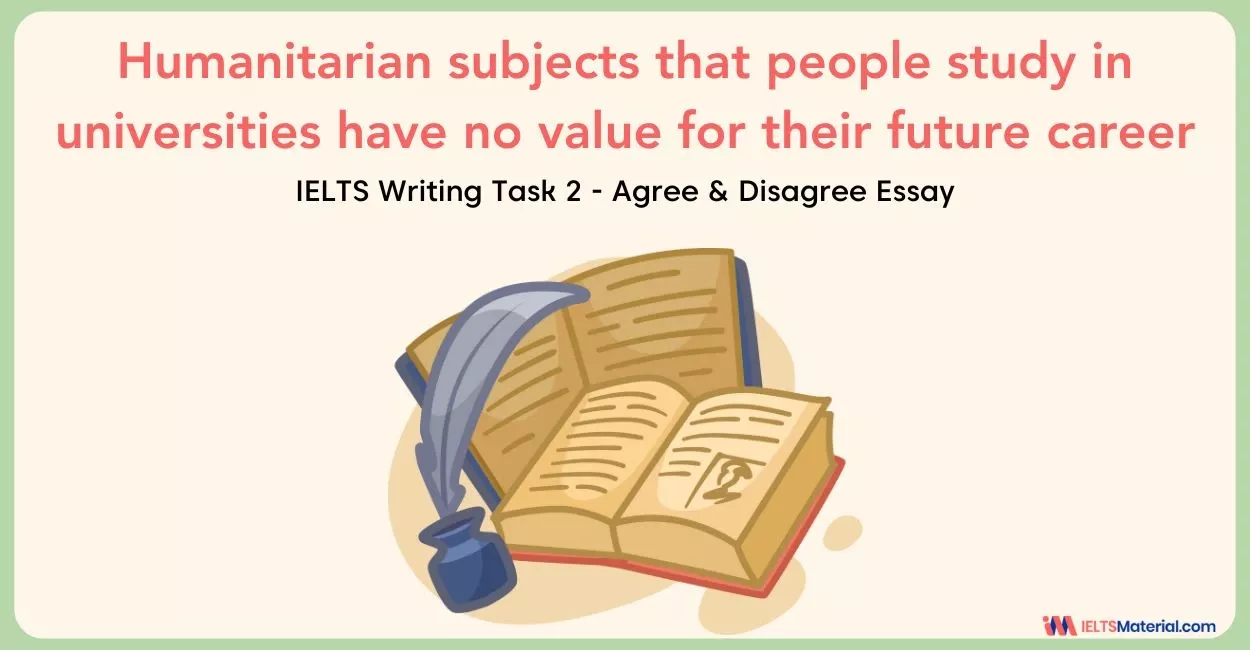


Post your Comments
4 Comments